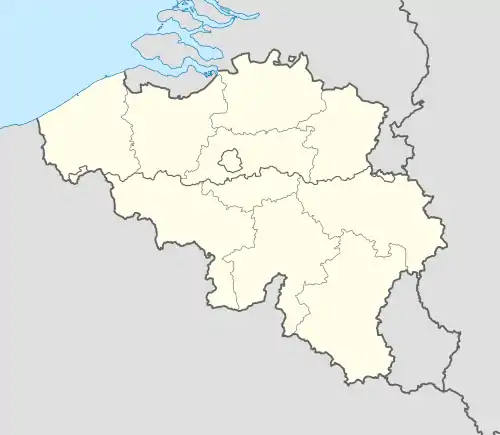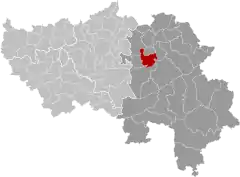Verviers
| |
|---|---|
 Palais de Justice (courthouse) | |
 Flag  Coat of arms | |
Location of Verviers | |
 Verviers Location in Belgium
Location of Verviers in the province of Liège  | |
| Coordinates: 50°35′N 05°51′E / 50.583°N 5.850°E | |
| Country | |
| Community | French Community |
| Region | Wallonia |
| Province | Liège |
| Arrondissement | Verviers |
| Government | |
| • Mayor | Muriel Targnion (PS) |
| • Governing party/ies | PS-MR-Nouveau Verviers |
| Area | |
| • Total | 33.01 km2 (12.75 sq mi) |
| Population (2018-01-01)[1] | |
| • Total | 55,198 |
| • Density | 1,700/km2 (4,300/sq mi) |
| Postal codes | 4800, 4801, 4802 |
| NIS code | 63079 |
| Area codes | 087 |
| Website | www.verviers.be |
Verviers (French pronunciation: [vɛʁvje] ⓘ; Walloon: Vervî) is a city and municipality of Wallonia located in the province of Liège, Belgium.
The municipality consists of the following districts: Ensival, Heusy, Lambermont, Petit-Rechain, Stembert, and Verviers. It is also the center of an agglomeration that includes Dison and Pepinster, making it the second biggest in the province and an important regional center, located roughly halfway between Liège and the German border.
Water has played an important role in the town's economy, notably in the development first of its textile and later its tourist industries. As a result, many fountains have been built in Verviers, leading it to be named Wallonia's "Water Capital".[2] The seats of the two Walloon public institutions for water distribution and water treatment are located in the town.[2][3]
History
Early history
Various flint and bone fragments, as well as Roman coins, were found in this area, attesting to the early settlements in the region. In the 4th century, the Romans had to deal with a constant push of Germanic tribes coming from the east. Successful at first at containing them, they finally had to concede defeat, allowing Clovis's Salian Franks to occupy the region at the end of the 5th century. The Verviers area was covered with forests and became a hunting ground for the Merovingian kings, who maintained a vicus in neighbouring Theux. It was also slowly Christianized by the monks of the nearby Abbey of Stavelot.
Late in the 10th century, Charles the Simple ceded the Marquisate of Franchimont to Notker of Liège, one of Notker's final steps in consolidating the Prince-Bishopric of Liège. Liège took direct control of the marquisate in 1014, an act which was confirmed by emperor Frederick Barbarossa and by Pope Adrian IV in 1155.
15th century to the present
The first mention of a textile industry in this area dates from the 15th century. One century later, the cloth industry took the place of the older metallurgical works, thanks in part to the Eighty Years War raging in the neighbouring Netherlands. The size of the town, however, remained relatively modest. It was only in 1651 that the expansion of the fulleries led to Verviers being recognized as one of the prince-bishopric's bonnes villes (main cities).
The end of the 18th century was troubled by the French Revolution. The annexation of Liège to France in 1795 caused a steep economic decline and unprecedented poverty. The city's fortunes rose again after the Battle of Waterloo (1815). Verviers was at the eastern end of the sillon industriel, the industrial backbone of Wallonia. Industrialist William Cockerill used British know-how to start a new era in Verviers' textile industry. Roads were paved, gas lighting was installed, and the city doubled in size thanks to the Industrial Revolution. After World War I, Verviers could share with Bradford the title of "Wool Capital of the World".
Economy
Verviers was home to a thriving wool and textile industry that was renowned for its quality and contributed greatly to the growth of the town. However, as of the 1950s, the local factories could not face international competition and started closing one after the other which prompted the economic decline of the town. The economy has been slowly recovering since the mid-1990s but remains fragile. Several commercial complexes have opened in recent years in an attempt to revitalize the most affected areas.
Sights

- Verviers counts several museums, including the Wool and Fashion Tourist Centre, housed in a former factory with a Neoclassical-style façade.
- The Grand Theatre, also known as La Bonbonnière, was built in the same style at the end of the 19th century, while the Grand Poste was built in the Neogothic style.
- The city has a number of interesting fountains and thematic strolling paths.
Notable people
- Jean-Jacques Andrien, film maker (1944)
- Bertrand Baguette, racing driver (born 1986)
- Christian Beck, writer and poet (1879–1916)
- André Blavier, poet and critic (1922–2001)
- William Cockerill, industrialist, settled in Verviers in 1799
- Mathieu Crickboom, violinist (1871–1947)
- Pierre David, twice mayor of Verviers (1771-1839)
- Brandon Deville, football player (born 1993)
- Jacques Drèze, economist (born 1929)
- Marc Duez, racing driver (born 1957)
- Albert Dupuis, composer (1877–1967)
- Emile Fabry (1865–1966), artist and painter.
- Philippe Gilbert, road racing cyclist (born 1982)
- Green Montana, rapper (born 1993)
- René Hausman, comic strip scenarist (1936-2016)
- Jean Haust, linguist and philologist (1868–1946)
- Max Houben, athlete (1898–1949)
- Steve Houben, jazz saxophonist and flutist (born 1950)
- Karima, writer (born 1976)
- Jean-Marie Klinkenberg, linguist (born 1944)
- Marc Lacroix, breast cancer researcher (born 1963)
- Guillaume Lekeu, composer (1870–1894)
- Roger Leloup, comic strip scenarist (born 1933)
- Raymond Macherot, cartoonist (1924–2008)
- Maurane, singer (1960–2018)
- Philippe Maystadt, politician (1948-2017)
- Dominique Monami, tennis player (born 1973)
- David Murgia, actor (born 1988)
- Nornagest, musician and writer (born 1977)
- Henri Pirenne, historian (1862–1935)
- Maurice Henri Léonard Pirenne, vision scientist (1912-1978)
- Pierre Rapsat, singer (1948–2002)
- Eliane Reyes, pianist (born 1977)
- Georges Ruggiu, radio presenter during the 1994 Rwandan genocide (born 1957)
- Albert Sambi Lokonga, footballer (born 1999)
- Lucy Sante, writer and critic (born 1954)
- Céline Scheen, classical soprano (born 1976)
- Jacques Stotzem, fingerstyle guitarist (born 1959)
- Jean Vallée, singer (1941–2013)
- Eric van de Poele, Formula One driver (born 1961)
- Henri Vieuxtemps, composer and virtuoso violinist (1820–1881)
- Violetta Villas, singer (1938–2011)
- Charles Weerts, racing driver (born 2001)
- Yvan Ylieff, politician (born 1941)
Education
Tertiary education
Tertiary educational institutions include:[4]
- Haute Ecole de la Province de Liège (Construction)
- Haute Ecole de la Province de Liège - Bachelier en soins infirmiers
- Haute Ecole CHarlemagne Verviers
- HELMO Verviers
Primary and secondary schools
Secondary schools include:[5]
- Athénée royal Thil Lorrain Verviers 1
- Athénée royal Verdi
- Centre scolaire Saint-François-Xavier
- Ecole Polytechnique - Enseignement de la Province de Liège
- Institut Notre Dame
- Institut Provincial d'Enseignement Secondaire (IPES)
- Institut Provincial d'Enseignement Secondaire Paramédical de Liège - Huy - Verviers
- Institut Sainte-Claire
- Institut Saint-François-Xavier 2
- Institut Saint-Michel
- Institut Technique Don Bosco
Demographics
Verviers has a significant Muslim population, with the proportion estimated to be approximately 25% as of 2020. Much of Verviers' Muslim community is impoverished, suffers from resentment, causing those disillusioned to become attracted to Islamic extremism as seen notably during the 2015 Verviers police raid on Islamists.[6][7][8]
The migrant communities also suffer from significant unemployment, and is of mainly Turkish and Moroccan origin. Verviers also has Kurdish, Congolese, Chechen, Somali and Sub-Saharan African communities.[9] Like its sister city of Roubaix in France, and Bradford in Britain, with similarly high Muslim populations, migrants from Africa and Asia moved in the 1960s to Verviers to work in industrial mills, and has suffered from subsequent poverty after its manufacturing was outsourced overseas.[10] Many migrants live in the Hodimont section of the town, where there are several Turkish restaurants, African shops, halal butcheries, and mosques.[11]
| Group of origin | Year | |
|---|---|---|
| 2023[12] | ||
| Number | % | |
| Belgians with Belgian background | 30,135 | 54.64% |
| Belgians with foreign background | 18,286 | 33.15% |
| Neighboring country | 1,430 | 2.59% |
| EU27 (excluding neighboring country) | 3,602 | 6.53% |
| Outside EU 27 | 13,254 | 24.03% |
| Non-Belgians | 6,735 | 12.21% |
| Neighboring country | 570 | 1.03% |
| EU27 (excluding neighboring country) | 1,694 | 3.07% |
| Outside EU 27 | 4,471 | 8.11% |
| Total | 55,156 | 100% |
Twin cities
Gallery
 City Hall
City Hall Church
Church Church: Notre Dame des Récollets
Church: Notre Dame des Récollets Roundabout with monumental houses
Roundabout with monumental houses The Ortmans fountain
The Ortmans fountain The Grand Poste
The Grand Poste
See also
References
- ↑ "Wettelijke Bevolking per gemeente op 1 januari 2018". Statbel. Retrieved 9 March 2019.
- 1 2 "Verviers". 8 January 2016.
- ↑ "Verviers, capitale de l'eau – Portail de la Wallonie". wallonie.be.
- ↑ "Ecoles supérieures ." Verviers. Retrieved 9 July 2017.
- ↑ "Ecoles secondaires ." Verviers. Retrieved 9 July 2017.
- ↑ "Deaths in Verviers". POLITICO. 10 July 2015. Retrieved 4 July 2023.
- ↑ "Belgian radical Islamists on margins among hometown Muslims". Reuters. 18 January 2015. Retrieved 4 July 2023.
- ↑ Traynor, Ian (16 January 2015). "The Belgian connections to Islamic radicalism". The Guardian. ISSN 0261-3077. Retrieved 4 July 2023.
- ↑ "Quiet Belgian town shocked by Islamist battle". Bangkok Post. Retrieved 3 July 2023.
- ↑ Conroy, Erin (25 January 2015). "Social exclusion leaves Belgium ripe for extremism". The National. Retrieved 3 July 2023.
- ↑ "Deaths in Verviers". POLITICO. 10 July 2015. Retrieved 4 July 2023.
- ↑ "Origin | Statbel". statbel.fgov.be. Retrieved 3 July 2023.
External links
- Official web site (in French)
- Alternative Facebook site (in French)
- . Encyclopædia Britannica. Vol. XXIV (9th ed.). 1888. p. 188.
